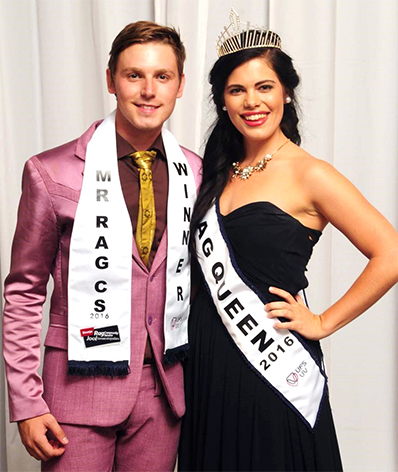
The winning duo: Stefan Lotter and Marzel van Zyl after being crowned Mr RAG and RAG Queen at the Brutal Fruit Coronation Ball.
Photo: Sarel Greyling
|
Stefan Lotter and Marzel van Zyl were crowned Mr RAG and RAG Queen at the prestigious Brutal Fruit RAG Coronation Ball on 12 February 2016. For the last 10 months, these University of the Free State (UFS) students have been collecting funds for community projects in the Free State.
Capitalise on existing platforms
Although they are patrons of charitable organisations external to the university, Stefan and Marzel revised their strategy to prioritise the UFS. “Some students on campus struggle, and, because charity begins at home, we will try to help the No Student Hungry and Right to Learn campaigns,” said Stefan.
However, he will continue to support the Northern Free State Caregivers, a 24-hour nursing service for terminally ill patients, for which he collected R15 000. For her part, Marzel was able to collect more than R20 000 for the Free State Residential Care Centre, which houses mentally challenged adults, and also hosts a skills development programme. The Centre’s baking workshop had to discontinue due to a lack of funding, but Marzel hopes that her contributions will bring about its revival and sustenance.
Bringing home the money
The winning duo are expected to represent our university at Mr & Miss SA Campus South Africa 2016. According to Stefan, they plan “to push the RAG agenda there and bring money back home,” at this charity-based pageant.